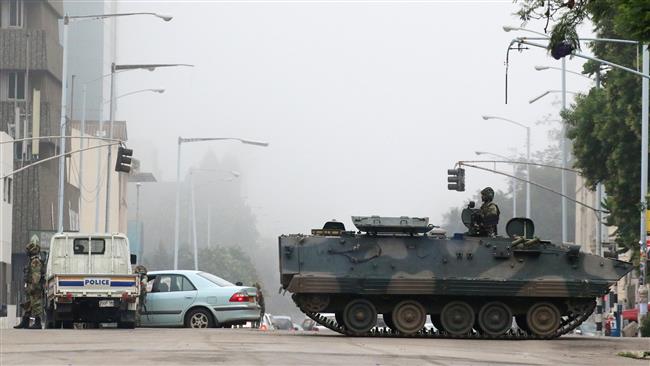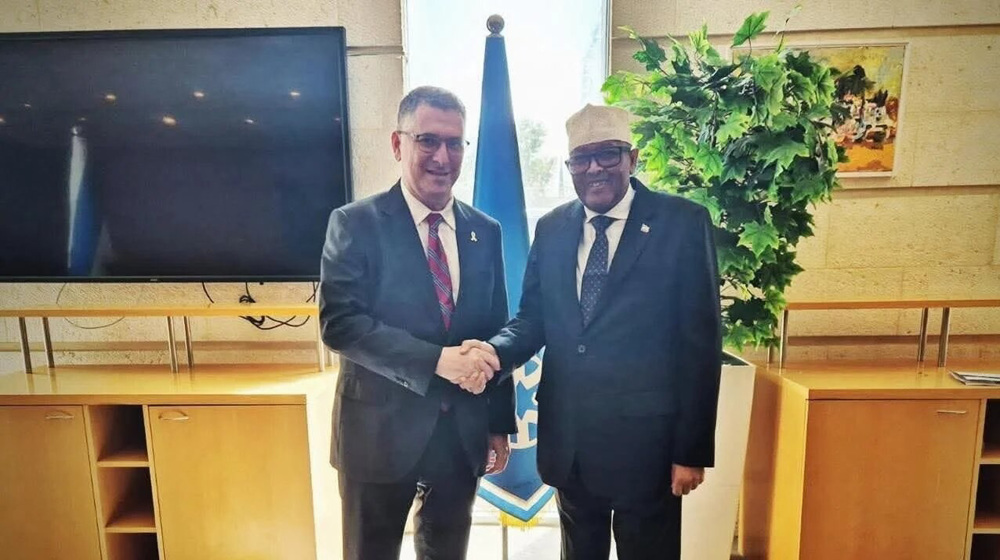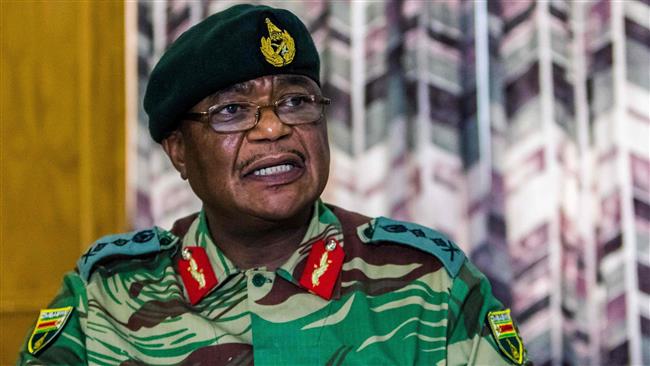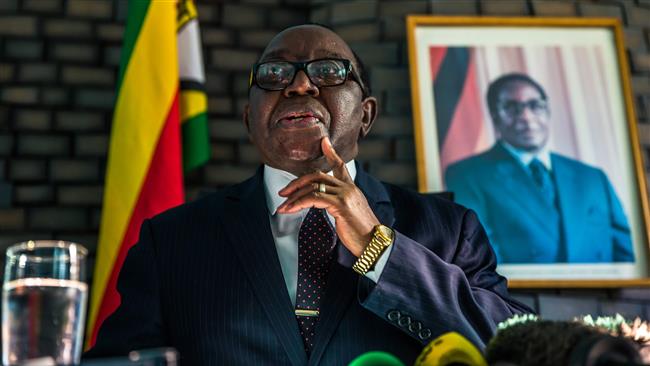Zimbabwe in ‘bloodless transition’ away from Mugabe
Zimbabwe’s ruling party, ZANU-PF, says the series of military activities underway in the country mark a “bloodless transition” of power from long-time President Robert Mugabe.
The army has deployed soldiers to the streets across the capital. Soldiers and armored vehicles have blocked roads to the main government offices, the parliament, and the courts in central Harare. The army has also taken over the headquarters of the national broadcaster.
In a series of tweets on Wednesday, Mugabe’s own ruling party denied that the totality of those activities amounted to a coup.
“Zimbabwe has not had a coup. There has been a decision to intervene because our constitution had been undermined, in the interim Comrade E Mnagngawa will be president of ZANU PF as per the constitution of our revolutionary organization,” it said in one tweet, referring to Emmerson Mnangagwa, who Mugabe sacked as his vice president earlier in the week.
“Last night the first family was detained and are safe, both for the constitution and the sanity of the nation this was necessary. Neither Zimbabwe nor ZANU are owned by Mugabe and his wife,” it said in another.
It was not clear who exactly was posting the tweets, and whether they reflected the mentality of the entire party.

Zimbabwean soldiers overran the headquarters of the state broadcaster and ordered staff to leave overnight Tuesday. After taking control of the national broadcaster, a spokesman for the military interrupted taped programming and read out a statement early on Wednesday.
“To both our people and the world beyond our borders, we wish to make it abundantly clear that this is not a military takeover of government,” said Major General S.B. Moyo.
He insisted that the army had taken action to “target criminals,” who were “committing crimes that are causing social and economic suffering” and was planning to “bring them to justice.”
“As soon as we have accomplished our mission, we expect that the situation will return to normalcy,” he added.

The statement did not clarify who it was referring to as “criminals” around Mugabe, but a government source later told Reuters that Finance Minister Ignatius Chombo had been among those detained. The minister was a leading member of the so-called ‘G40’ faction of the ZANU-PF party, run by the president’s wife, Grace Mugabe.
Moyo called on security services to “co-operate for the good of our country” and warned that any provocation would “be met with an appropriate response.”
He said all soldiers on leave “should return to barracks immediately.”
The major general also urged the public to remain calm but called on them “to limit unnecessary movement.”
Shortly after the army seized the national broadcaster, a number of loud explosions were heard in the capital, Harare.
Mugabe talks to Zuma, confirms ‘house arrest’
Later in the day, Mugabe talked to South Africa’s President Jacob Zuma on the phone, confirming that he was under house arrest but that he was fine, Zuma’s office said in a statement.
Zuma said he was sending special envoys to Zimbabwe to meet with Mugabe and the Zimbabwean Defense Force.
The South African president would be sending the envoy in his capacity as chairman of the Southern African Development Community (SADC), which is an inter-governmental organization among 16 southern African states. The organization works to resolve economic and political challenges faced by the regional countries.
And so begins a coup
Zimbabwe has been on edge since Monday, when army chief General Constantino Chiweng held a press conference warning that the army was prepared to act to end purges within Mugabe’s ZANU-PF party. The ruling party accused the army chief of “treasonable conduct.”
Political tension started to rise in the South African country after Mugabe, in a sudden decision, sacked Mnangagwa this week.
Mnangagwa had previously been considered the most likely to succeed the president if Mugabe resigned or died while in power. His sudden dismissal, however, raised speculations that Mugabe was clearing the way for his wife, Grace, to take the position.
Mugabe, 93, came to power in the 1980s. He has been the longest serving leader in Africa.

‘Coup by any name’
A former political aide to ex-Zimbabwean prime minister Morgan Tsvangari, told the CNN that the army’s action was “a coup by any other name.”
“They are being very careful in their words,” said Alex Magaisa. “They might be trying to give a fig leaf to the notion that President Mugabe is still the leader. But de facto they are obviously the military force.”
US, UK issue warnings to citizens
The United States and the United Kingdom both issued warnings to their citizens inside the African country.
US State Department encouraged the Americans in the country to “shelter in place until further notice” due to ongoing uncertainty and political unrest. A US embassy spokesman in Zimbabwe also said the embassy would be closed to the public on Wednesday.
The UK Foreign Office, meanwhile, advised Britons in Zimbabwe to avoid demonstrations and rallies, saying it was “monitoring the situation closely.”
Merz’s ‘political naivety’ has cost Germany its role in Iran talks: Araghchi
Israel cancels Rafah evacuation for Gaza patients amid renewed massacres
Iran’s deterrence power strengthened after ballistic missile upgrades: Top general
Hind Rajab Foundation files war crimes complaint in US against Israeli-American trooper
VIDEO | Press TV's news headlines
VIDEO | Coordination Framework gives Kurdish parties 48-hour deadline to choose presidential nominee
VIDEO | Palestine Action activists walk free after huge court win
VIDEO | Italy's and EU's hypocrisy exposed when it comes to condemning Israeli crimes














 This makes it easy to access the Press TV website
This makes it easy to access the Press TV website